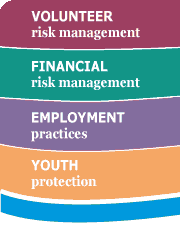Rock n’ Roll n’ Risk Management
A friend of the Center, who happens to be an accomplished sound engineer, forwarded a terrific article to us this week about how the best rock n’ roll roadies can do things many music fans might believe are impossible. Why? Well, one reason seems to be that roadies and members of production crews are motivated to do the impossible because the show must always go on.
Why Roadies Are Our Best Bet For Typhoon Haiyan Relief In The Philippines, by Ruth Blatt, published at www.forbes.com, features an interview with Charlie Hernandez, a former roadie and production manager for The Police. Blatt, who writes about “the intersection of rock n’ roll and business,” describes how roadies and the rock concerts they support “descend upon a site and then quickly disappear. Along the way, they face technical complexity, divergent regulations, multiple vendors, language barriers, and the certainty of unforeseen obstacles.”
As we read about how touring professionals came together to provide relief in Haiti and Pakistan after the disasters in those countries in 2010, we couldn’t help but see that the talents of roadies offer valuable lessons for nonprofit leaders charged with ensuring that their missions go on.
Risk Tips from the Road
- Ask for Help and Be Eager to Help — In addition to “somebody to love,” every nonprofit leader needs lots of somebodies to help sustain a charitable mission. The article explains that despite the demands of the work and lifestyle, many roadies and production managers spend their free time helping others. As a result, the best in the business have bigger contact lists in their cell phones than professional match makers. According to our sound engineer friend, keeping a mental note of the skills and interests of people you meet on the road, and saving contact details, are essential to getting the help you need when you need it.
- Close the Loop — Roadies don’t call it a day until every piece of equipment is packed up and on the truck or headed to the airport. The ability to follow-through until the job is completely done is essential to making sure the band is ready for the next stop on the tour. The commitment to closing the loop is applicable in risk management as well. Whether it’s conducting an in-depth review of the nonprofit’s policies and the actions taken by staff after an accident or near-miss, or taking the time to tell a vendor the reasons you’ve decided to change providers, closing the loop is fundamental to preserving trust in key relationships, learning from experience, and inspiring confidence in your mission and team.
- Inspire Loyalty — Blatt’s article explains that “fierce camaraderie” is a must in the tough business of rock n’ roll. That means you’re unlikely to hear about a roadie throwing a fellow roadie under the tour bus, literally or figuratively! Many nonprofit leaders have learned the hard way that you need to earn, rather than insist, on loyalty. True loyalty exists in nonprofits where staff members believe that executives bring integrity to the job each and every day. In the world of risk management, lukewarm loyalty is a downside risk waiting to materialize. When staff are disloyal or disillusioned they are more likely to disregard the risk management policies of the nonprofit.
The Queen song The Show Must Go On was the final track on the rock band’s 1991 album, Innuendo. Written principally by band member Brian May, The Show Must Go On is regarded as a tribute to the bravery and fierce determination of lead singer Freddie Mercury, who continued to perform despite being gravely ill. The song was released as a single, just six weeks before Mercury died in 1991. The song reminds us that nonprofit missions are vital to the health and well-being of individuals, communities and the environment, and therefore must also go on. To reach your goal of becoming an effective risk champion, remember to ask for help and give help freely, close the loop after accidents and near-misses, and inspire true loyalty by leading with integrity.
Melanie Herman is Executive Director and Alexandra Ricketts is Project Manager at the Nonprofit Risk Management Center. Melanie and Alex welcome your feedback on this article or questions about the Center’s resources for nonprofits at Melanie@nonprofitrisk.org, Alexandra@nonprofitrisk.org or (202) 785-3891.






